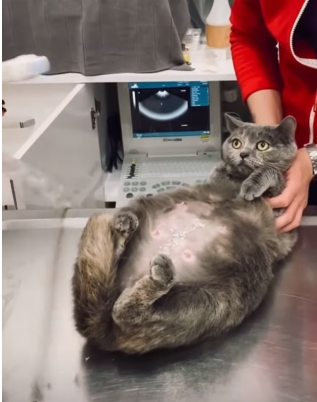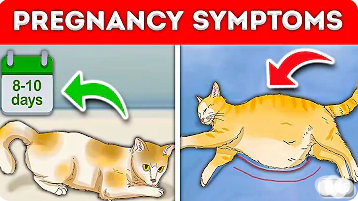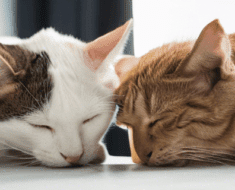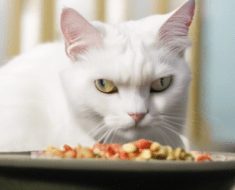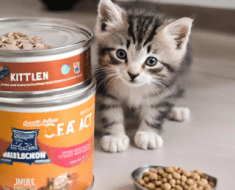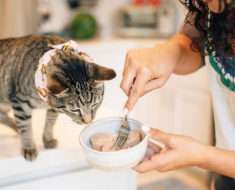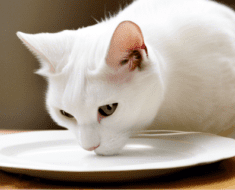Caring for a pregnant cat involves providing proper nutrition and a comfortable, stress-free environment. Regular vet check-ups are essential for monitoring the cat’s health during pregnancy.
Additionally, creating a nesting area and ensuring she has a quiet space is crucial for her well-being. It’s important to handle her with care and observe any changes in behavior. Offering a balanced diet with high-quality food tailored for pregnant cats supports her and her kittens’ health.
Proper hygiene and maintaining a peaceful atmosphere aid in ensuring a successful pregnancy. Keeping her indoors and away from potential dangers is key to a smooth pregnancy. You can help your pregnant cat through this special time by providing love, care, and attention.
Preparing For Pregnancy cat
Preparing for Pregnancy: Welcoming a pregnant cat into your home requires careful planning and preparation to ensure the health and safety of the mother and her future kittens.
Creating A Safe Environment
Designate a quiet, comfortable space for your pregnant cat to rest and nest.
- Provide a cozy bed with soft bedding to support her changing body.
- Keep the area warm and noise-free to reduce stress.
Ensure fresh water and nutritious food are easily accessible for her.
Consulting With A Veterinarian
Schedule a vet visit to confirm the pregnancy and discuss prenatal care.
- Follow recommended vaccination and parasite control protocols.
- Receive guidance on a balanced diet tailored for pregnancy.
Discuss potential warning signs or complications to watch for during gestation.
Nutritional Needs
Nutritional needs for a pregnant cat are of utmost importance to ensure her health and the health of her unborn kittens. Providing a proper diet that meets her specific needs is crucial during this delicate time. Focusing on the subheading of nutritional needs, it’s essential to understand the importance of a balanced diet, the role of supplements and treats, and how these factors contribute to the well-being of the pregnant cat.
Importance Of A Balanced Diet
A balanced diet is critical for a pregnant cat as it directly impacts her overall health and the development of her kittens. High-quality protein, essential vitamins, and minerals must be included in her diet to support the growing demands of pregnancy. Additionally, adequate hydration is necessary to maintain her well-being.
Supplements And Treats
Supplements and treats can play a supportive role in ensuring a pregnant cat receives essential nutrients. However, it’s crucial to consult with a veterinarian before incorporating any supplements into her diet. Calcium and Folic acid are commonly recommended supplements, while excessive treats should be avoided to prevent unnecessary weight gain.
Monitoring Health
Caring for a pregnant cat involves more than just providing proper nutrition. Monitoring her health is essential to ensure a safe and successful pregnancy. Regular health check-ups and being aware of signs of complications are crucial aspects of managing your pregnant cat’s well-being.
Regular Health Check-ups
Regular health check-ups are a vital part of caring for a pregnant cat. It allows the veterinarian to monitor the cat’s overall health and detect any potential issues early on. During these check-ups, the vet will assess the cat’s weight, listen to her heart and lungs, check for parasites, and ensure her vaccinations are up to date.
By bringing your pregnant cat for these check-ups, you can ensure any health concerns are addressed promptly. Early detection and intervention are key to preventing complications and ensuring the well-being of both the mother and her kittens.
Signs Of Complications
Recognizing signs of complications during pregnancy is vital for providing optimal care to your expectant cat. Remaining vigilant and attentive to changes in her behavior, appetite, or physical appearance is essential for early detection.
Here are several indicators that may suggest complications requiring veterinary attention:
1. Loss of appetite: A sudden and significant decrease in appetite may indicate an underlying issue.
2. Weight loss: If the cat experiences unexplained weight loss instead of the expected gain, it warrants concern.
3. Unusual discharge: Any abnormal vulva discharge could signify an infection or complication.
4. Excessive panting: If the cat exhibits excessive panting or struggles to catch her breath, it may indicate a problem requiring attention.
By staying observant and proactive in monitoring your cat’s well-being, you can promptly address any potential complications and ensure the best outcome for her and her kittens.
It’s important to note that while these signs could be normal pregnancy-related changes, consulting with your veterinarian is crucial to rule out any complications.
Maintaining regular health check-ups and being aware of signs of complications are critical aspects of caring for a pregnant cat. By remaining proactive and attentive, you can provide the best possible care and ensure a healthy and successful pregnancy.
Behavioral Changes
“Throughout pregnancy, a cat undergoes a myriad of behavioral shifts, vital to acknowledge and comprehend for optimal care. These alterations encompass mood fluctuations and nesting tendencies, characteristic of expectant felines. Recognizing these shifts and implementing appropriate responses is pivotal in fostering a serene and stress-free pregnancy journey for your beloved cat. By staying attuned to these changes and employing proactive measures, you can effectively nurture your cat through this transformative period.”
Understanding Mood Swings
Pregnancy hormones can cause significant mood swings in a pregnant cat. One moment she may be affectionate and seeking attention, while the next she might become distant or irritable. It’s essential to approach these mood swings with patience and understanding, as they are a normal part of the pregnancy journey.
During mood swings, it’s best to give your cat space and avoid forcing interaction. Respect her boundaries and allow her to come to you when she feels more comfortable. Providing a calm and stress-free environment can also help to alleviate mood swings and promote feelings of security for your pregnant cat.
Nesting Behaviors
During pregnancy, cats often display nesting behaviors as they prepare for the imminent arrival of their kittens. These instincts drive them to seek out tranquil, secluded spots where they can arrange soft materials like blankets or towels to create a cozy nest. Understanding and accommodating these natural inclinations are crucial for ensuring your cat’s overall well-being and comfort.
To support your cat’s nesting behavior, it’s beneficial to provide a designated area where she can comfortably build her nest. Choose a quiet, warm space away from any loud noises or disruptions. Additionally, ensure that the bedding materials, whether blankets or towels, are clean and easily washable to maintain hygiene.
It’s worth noting that nesting behaviors typically become more pronounced towards the end of the pregnancy. Therefore, being prepared and having the nesting area ready well in advance is advisable. By tending to your cat’s nesting needs and establishing a conducive environment, you can help alleviate her stress and foster a sense of security during this crucial phase.
Preparing For Birth
Setting Up A Birthing Area
Creating a safe, comfortable birthing area for your pregnant cat is essential. Choose a quiet, warm, and secluded space – a cozy box lined with clean towels or blankets works well. Ensure it’s easily accessible but provides privacy for the mother. Keep the area free from drafts and other pets, and consider using a heating pad or lamp to maintain a steady temperature.
Knowing When To Seek Help
It’s important to monitor your pregnant cat closely as she nears her due date. Watch for signs of labor, such as restlessness, pacing, vocalization, and nesting behavior. If she experiences strong contractions for more than 30 minutes without producing a kitten, or if she seems distressed or unwell, seek immediate assistance from a veterinarian.
Postnatal Care
Postnatal care for a pregnant cat is essential in ensuring the health and well-being of both the mother and her newborn kittens.
Providing Support For The Mother
- Give the mother cat a quiet, secluded area to nurture her kittens.
- Offer fresh water, nutritious food, and plenty of rest for the mother cat.
- Monitor the mother cat for any signs of distress or health issues.
Caring For Newborn Kittens
- Keep the kittens warm in a comfortable nest away from drafts.
- Help the kittens nurse by ensuring they latch onto the mother’s teats.
- Gently handle the kittens to check for cleanliness and health.
Common Issues And Solutions
There are some Common Issues and Solutions:
Dealing With Prenatal Stress
Prenatal stress in pregnant cats can lead to various complications. To prevent this:
- Ensure a calm and quiet environment
- Provide a comfortable and secluded space
- Limit exposure to loud noises or disruptive activities
Handling Birthing Complications
Birthing complications can arise unexpectedly. Be prepared by:
- Knowing the signs of distress in the pregnant cat
- Having emergency contact numbers for a vet-ready
- Creating a birthing kit with the necessary supplies
Importance Of Spaying And Neutering
Know the Importance of Spaying and Neutering
“Spaying and neutering your cat holds paramount importance, not only for their individual well-being but also in addressing the larger issue of feral and stray cat populations. By comprehending the enduring health advantages and acknowledging the necessity of curbing overpopulation, you can actively contribute to cultivating a healthier and more sustainable cat community. Embracing this proactive approach fosters long-term benefits for both individual cats and the broader ecosystem alike.”
Long-term Health Benefits
Spaying and neutering have numerous health benefits for pregnant cats. This procedure can help prevent uterine infections and certain types of cancers, reducing the risk of health complications as they age. It can also minimize aggressive behavior and roaming tendencies, leading to a happier and calmer cat.
Addressing Overpopulation Concerns
Spaying and neutering are essential in addressing the overpopulation of cats. By preventing unplanned litter, it helps alleviate the burden on animal shelters and reduces the number of homeless cats. This ultimately contributes to a more sustainable and balanced cat population, benefiting both the animals and the community.
Frequently Asked Questions For Caring For A Pregnant Cat
How Can I Tell If My Cat Is Pregnant?
Cats may exhibit signs such as increased appetite, weight gain, and nipple enlargement.
What Should I Feed My Pregnant Cat?
Provide a balanced diet high in protein and essential nutrients with preferably designated for pregnant cats.
When Should I Take My Pregnant Cat To The Vet?
Schedule a vet visit shortly after confirming pregnancy and again towards the end of gestation.
Is It Safe For A Pregnant Cat To Be Around Other Pets?
Pregnant cats can be around other pets, but limit stressful interactions and ensure vaccinations are up-to-date.
How Can I Prepare For My Cat’s Delivery?
Create a comfortable birthing area and have emergency vet contact information readily available.
Conclusion
Securing the well-being of a pregnant cat demands dedication and understanding. By furnishing a balanced diet, regular veterinary check-ups, and a cozy living space, you can assist your cat in navigating the exhilarating yet demanding phase of pregnancy. With conscientious attention and nurturing, you can play a pivotal role in fostering the health and contentment of both the mother and her forthcoming kittens.
